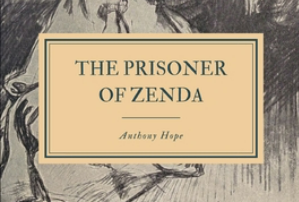Chapter 2 — Concerning the Colour of Men’s Hair
byChapter 2 – Concerning the Colour of Men’s Hair begins with Rudolf Rassendyll making good on his uncle’s peculiar but firm travel tradition: never pass through Paris without a stop. His brief stay involves reconnecting with George Featherly, a contact at the British Embassy, and dipping into the city’s vibrant energy. George introduces him to Bertram Bertrand, a melancholic poet who openly obsesses over Antoinette Mauban—a woman known in aristocratic circles for her charm, intelligence, and complicated romantic connections. Bertram’s lament, though theatrically delivered, gives Rudolf an early glimpse into the entanglements that surround Antoinette. Through idle conversation and whispered speculation, it’s revealed that Antoinette has links to Duke Michael, a man who stands second in line for Ruritania’s throne. The night ends not with resolution but with a question—what draws such women toward power, and what do they leave behind in their wake?
As Rudolf leaves Paris and heads toward the Tyrol, fate ensures his path crosses once again with Antoinette Mauban, though they remain strangers on the same train. She boards the same carriage, traveling under quiet pretense but with evident distinction. Her presence stirs curiosity in Rudolf, and though no words are exchanged, her elegance and mystery are undeniable. They part ways in Dresden, but not before she leaves an impression—of someone poised at the center of something far larger than personal drama. Rudolf, meanwhile, alters his own route spontaneously, skipping the coronation crowd in Strelsau in favor of a quieter stop in Zenda. Unbeknownst to him, this decision sets a key narrative chain in motion. What appears casual is, in fact, destiny cloaked in spontaneity.
At a village inn near Zenda, Rudolf is met with more than rest—he encounters the raw sentiments of locals wary of the soon-to-be-crowned King. Their conversations betray a clear preference for Duke Michael, whom they describe as noble, generous, and closely involved in their lives. By contrast, the King’s name stirs indifference or outright distrust. The village folk speak openly, unaware of who Rudolf is or what he represents, making their honesty all the more valuable. One comment suggests Michael hopes to marry Princess Flavia, blending political ambition with personal gain. This small-town gossip is far from idle—it hints at an undercurrent of unrest and unresolved succession politics. Rudolf listens with growing interest, drawn not by a desire for intrigue but by an innate sense that more lies beneath the surface.
During a quiet moment at the inn, the innkeeper’s assistant, Johann, observes Rudolf closely and makes a curious comment. He notes that Rudolf’s features resemble those of the Elphberg royal family—particularly their distinctive hair color and strong facial structure. The remark is delivered casually but unsettles Rudolf, who is vaguely aware of ancestral whispers linking his family to Ruritanian nobility. This striking resemblance, though brushed off initially, plants a seed of foreshadowing. In storytelling, such coincidences often signal future complications, and this instance is no different. Readers are invited to wonder: is identity only a matter of blood, or also of fate and opportunity? This passing remark becomes the hinge on which a nation’s story will soon swing.
In crafting this chapter, the author blends travel narrative with subtle world-building, allowing readers to gather character insights through overheard opinions and unintended glances. Rather than introducing the political tension with blunt exposition, it unfolds organically through Rudolf’s casual interactions. Antoinette’s silent presence, Michael’s rumored ambitions, and the village’s sharp observations all create a fabric of expectation. For readers, the chapter functions like the hush before a storm—full of detail, yet cloaked in calm. This approach mirrors real-world power dynamics, where loyalty is often formed not through law but personal experience and proximity. The people of Zenda trust Michael not because of title, but because he’s seen, spoken of, and close.
What becomes evident is that the Ruritanian people are deeply divided—not by formal alliances, but by experience and perception. While the King is technically the rightful ruler, Michael enjoys grassroots support due to familiarity and visibility. This dynamic speaks volumes about the nature of public favor: distance breeds doubt, and proximity breeds allegiance. Rudolf, a foreigner and observer, absorbs this contrast with both interest and unease. He starts to understand that monarchies, like any form of leadership, are upheld as much by public trust as they are by lineage. The foundation has been laid for the question that will drive much of the novel—who truly deserves power, and how easily can that perception be shaped or stolen?
Beyond the plot, this chapter holds modern relevance in how it explores identity, public image, and leadership. Whether in politics or media, individuals often rise to prominence based on how well they can be seen and remembered. Duke Michael, by cultivating his presence among the people, gains an edge over a distant King. Antoinette’s romantic entanglements parallel this theme: affection and ambition often mingle, especially when proximity to power is at stake. Rudolf’s growing awareness of these dynamics pulls him out of his passive traveler’s role. He is no longer simply sightseeing—he is standing at the edge of a story that will soon demand his full participation.
By the chapter’s end, the reader is primed for what lies ahead. Rudolf’s resemblance to the Elphbergs, Antoinette’s mysterious movements, and the villagers’ candid opinions all point toward a convergence of fate, identity, and politics. There is no grand confrontation yet—only a quietly building storm. For now, Rudolf remains an observer, but his passive role is slipping. Each interaction draws him closer to the center of a national crisis, one that will force him to answer questions not just about who he is, but who he must become. And in doing so, the chapter closes not with resolution, but with anticipation.


